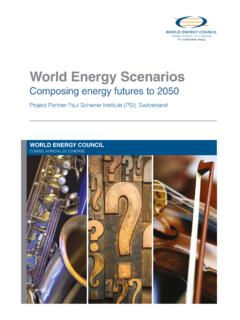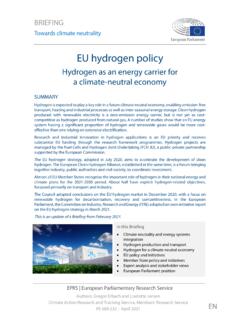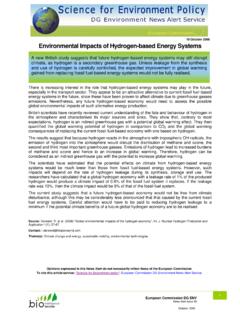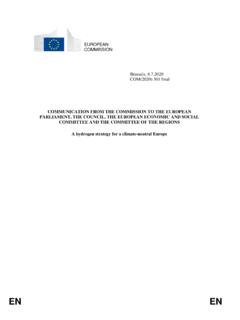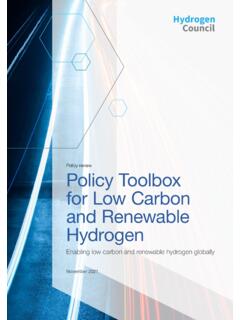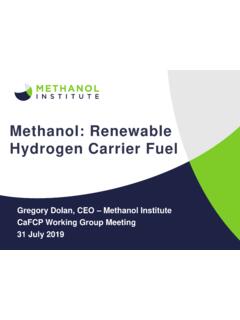Transcription of HYDROGEN ON THE HORIZON: READY, ALMOST SET, GO? …
1 WORKING PAPER | NATIONAL HYDROGEN STRATEGIESHYDROGEN ON THE HORIZON: READY, ALMOST SET, GO?World Energy Council, in collaboration with EPRI and PwC2 WORLD ENERGY COUNCIL IN COLLABORATION WITH EPRI AND PWCThe World Energy Council has been at the heart of global, regional and national energy debates for nearly a century, developing new thinking and driving effective action around the world to achieve the benefits of sustainable energy for all. Comprised of over 3,000 member organisations in nearly 90 countries, drawn from governments, private and state corporations, academia and new and wider system shapers stakeholders, the Council is the world s first and only truly global member-based energy network.
2 The Council works dynamically across the whole energy sector as a global energy transitions platform, pulling together intelligent leadership to catalyse and inform the world s energy policy dialogue, create impact and drive practical action. The Council does not advocate for any country, company, technology or source of energy. The World Energy Council remains thoroughly committed to the challenge of being both impartial and learn more visit Published by the World Energy Council in September 2021 Copyright 2021 World Energy Council. All rights reserved. All or part of this publication may be used or reproduced as long as the following citation is included on each copy or transmission: Used by permission of the World Energy Council.
3 World Energy Council Registered in England and Wales No. 4184478 VAT Reg. No. GB 123 3802 48 Registered Office 62 64 Cornhill London EC3V 3NH United KingdomWORLD ENERGY COUNCILABOUTWORKING PAPER This Working Paper on HYDROGEN is part of a series of publications by the World Energy Council focused on Innovation. It was developed in collaboration with the Electric Power Research Institute (EPRI) and PwC. EPRI and Gas Technology Institute (GTI) have created the Low-Carbon Resources Initiative (LCRI) to address the challenges and gaps in achieving deep carbon reductions across the energy economy.
4 LCRI is focused on the value chain of alternative energy carriers and low-carbon fuels such as HYDROGEN , ammonia, biofuels (including renewable natural gas, and synthetic fuels and research, development, and demonstration to enable their production, storage, delivery, and use across the energy economy. These energy carriers/fuels are needed to enable affordable pathways to economy-wide decarbonization by mid-century. This five-year, global collaborative will identify and accelerate fundamental development of promising technologies; demonstrate and assess the performance of key technologies and processes, identifying pathways to possible improvements; and inform key stakeholders and the public about technology options and potential pathways to a low-carbon future.)
5 PwC is a network of firms in 155 countries with over 284,000 people committed to delivering quality in assurance, advisory and tax services, including more than 20,000 professionals engaged in the energy, utilities and resources sectors. With its global strategy, The New Equation, PwC is responding to the challenges shaping the world today, with a focus on building trust and delivering sustained outcomes that create value for organisations, their stakeholders and broader society. Climate change is one of the world s most pressing problems, and PwC has committed to reach net zero greenhouse gas emissions by 2030 and is working with organisations to accelerate their own climate-based transformation.
6 PwC and the World Energy Council have a common goal of promoting energy transition and sustainability by engaging with policymakers and leading industry players. Our shared view is that energy transition and sustainability are achieved through the interaction of robust policy frameworks and a strong, competitive energy industry. Learn more about PwC In a fast-paced era of disruptive changes, this working paper aims at facilitating strategic sharing of knowledge between the Council s members and the other energy stakeholders and policy shapers and contribute to a global dialogue on HYDROGEN s role in energy transitions.
7 This working paper builds upon earlier work by the Council and involved extensive research on national strategy developments and interviews with 38 experts from 23 countries, reflecting 61 % of the global Total Primary Energy Supply TPES (2018 data, OECD) and 70% of global GDP (2019 data, WB).3 WORKING PAPER - NATIONAL HYDROGEN STRATEGIESINTRODUCTIONThe World Energy Council, in collaboration with EPRI and PwC, aims to provide a better understanding of HYDROGEN development worldwide for the energy community, building on the expertise and experience of its global network.
8 In this context, we published a new Innovation Insights Briefing on HYDROGEN in July 2021, seeking to start a multi-stakeholder, multi-level community dialogue on HYDROGEN s role in energy transitions. Our work has identified the following 4 areas for further discussion: Significant divergences are emerging across countries and regions, as national HYDROGEN strategies reveal varying attitudes towards HYDROGEN s role in energy transitions. This signals a need to embrace diversity eliminating a one size fits all mindset and enable differing technologies and use cases to be over colours is stifling innovation, with over-simplification and colour prejudice risking the premature exclusion of some technological routes that could potentially be more cost- and carbon-effective.
9 There is a need for further dialogue which looks beyond colour to also explore carbon HYDROGEN perspectives are needed to advance the Humanising Energy agenda. The current HYDROGEN conversation focuses heavily on supply, ignoring the role of HYDROGEN users. Discussions must explore what s needed to trigger demand, with a specific focus on the development of HYDROGEN infrastructure and a global supply HYDROGEN economy could stimulate job creation and economic growth, potentially helping to fulfil build forward together ambitions post-COVID-19. Several national HYDROGEN strategies highlight jobs as an important driver of HYDROGEN development, with opportunities to reskill the existing workforce and upskill a new help inform the dialogue on these 4 topics, we are releasing 3-part series working papers for the HYDROGEN road builders, providing additional insights on:National HYDROGEN Strategies;Inputs From Senior Leaders On HYDROGEN Developments.
10 HYDROGEN Demand And Cost Working Paper focuses on exploring the national HYDROGEN strategies being increasingly published globally to support HYDROGEN development. It builds onto the Council s German Member Committee s report looking at national HYDROGEN strategies that was published in September 2020, and further explores the different HYDROGEN stories emerging between countries and ENERGY COUNCIL IN COLLABORATION WITH EPRI AND PWCThe development of a HYDROGEN economy is still at its early stages with few countries having published strategies, though there is broadening global interest and support.

